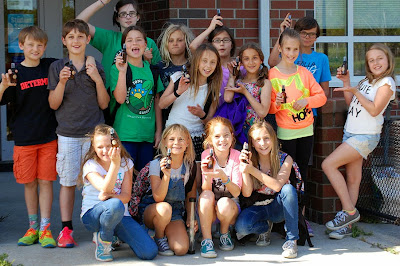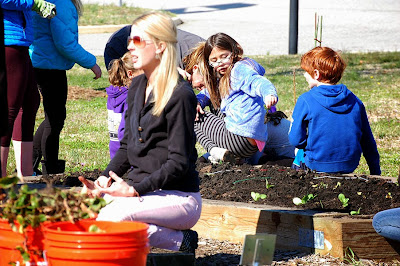Monday, May 4, 2015
Conservation Conversation for 20 Please
Students of the Green LIONS Garden Group were game show contestants at our last meeting; contestants of Garden Jeopardy that is. Our categories were Down on the Farm, Conservation Conversation, Garden Friends, and Plant Rant. The winning team now receives the prestigious honor of being first in line at the Harvest Tasting!
And what will be served at the Harvest Tasting later this month? Just take a look.
Chemical-Free Garden, Chemical-Free Us
One of the greatest lessons we teach to the students of the Green LIONS Garden Group is how to grow plants without the use of harmful chemicals. By diligently monitoring the presence of pests and the balance of beneficial predator insects, and by strengthening our plants with natural fertilizers like compost and companion plants students understand that there is no need to take the short-cut, chemical route. Nature takes care of you if you take care of it.
So as we move into mosquito season, we thought this would be a great time to translate the care of the garden to the care of our bodies. If we take care of our health, our bodies will take care of us.
Many body care products are full of harmful chemicals. While a little of this and a little of that can be benign in small doses, in the end most people use a little of a lot of different things which can add up in a hurry. If you are interested in determining if your favorite products are safe for you and safe for the earth, you can visit ewg.com. This site is a vast database of information on products we use on our body, in our body, in our home and more.
Students were apothecaries for a day by making their own bug repellant spray and (if that doesn’t work) bug bite balm to take the itch and sting away and expedite healing.
The two recipes couldn’t be simpler and we have provided them below. Consider looking into what other body care products and cleaning supplies you can make on your own. There are multiple sites with recipes and you’ll soon see how easy and economical it can be. Enjoy!
Herbal Bug Repellant Spray
Fill a pump bottle (we used 2 oz. amber glass spray bottles, but you can go bigger) half way with distilled water. Fill the remainder of the bottle almost full with witch hazel, leaving a little room for essential oils.
For our 2 oz. bottles we used three drops each citronella, rosemary, lavender and cinnamon essential oils. For a larger bottle you can add more. You may also want to try other oils like eucalyptus or lemon.
So as we move into mosquito season, we thought this would be a great time to translate the care of the garden to the care of our bodies. If we take care of our health, our bodies will take care of us.
Many body care products are full of harmful chemicals. While a little of this and a little of that can be benign in small doses, in the end most people use a little of a lot of different things which can add up in a hurry. If you are interested in determining if your favorite products are safe for you and safe for the earth, you can visit ewg.com. This site is a vast database of information on products we use on our body, in our body, in our home and more.
Students were apothecaries for a day by making their own bug repellant spray and (if that doesn’t work) bug bite balm to take the itch and sting away and expedite healing.
The two recipes couldn’t be simpler and we have provided them below. Consider looking into what other body care products and cleaning supplies you can make on your own. There are multiple sites with recipes and you’ll soon see how easy and economical it can be. Enjoy!
Herbal Bug Repellant Spray
Fill a pump bottle (we used 2 oz. amber glass spray bottles, but you can go bigger) half way with distilled water. Fill the remainder of the bottle almost full with witch hazel, leaving a little room for essential oils.
For our 2 oz. bottles we used three drops each citronella, rosemary, lavender and cinnamon essential oils. For a larger bottle you can add more. You may also want to try other oils like eucalyptus or lemon.
Patience: One of Nature’s Greatest Lessons
In a world where we are used to instant gratification, it can be nice to know that some things are worth waiting for. Even if we have to wait three years for that first bite.
We planted asparagus in our spring garden this year. Asparagus is an interesting plant. Traditionally once it is planted it needs to grow through two full springs untouched. Then in that third spring the delicate spears can be harvested. While its growing season each spring is short, asparagus is a perennial, and will give back to us year after year.
Patience is one of many lessons students can experience first hand in a garden. Students also learn kindness, how to be gentle, how to nurture and to take in their world with all of their senses. Learning how to respect and care for plants goes beyond the garden beds. This devotion is translated to their community and the world at large and changes they way they interact with their environment.
While asparagus is our exciting new addition to the garden this year, students of the Green LIONS Garden Group planted many of our favorite spring plants: tender lettuces and spinach, spicy arugula, spunky radishes, vibrant purple carrots (the most nutritious variety for us by the way!), humble turnips, robust beats, crunchy sugar snap peas, elegant nasturtiums, dependable kale, and hearty cabbage and broccoli. We also spruced up the herb bed with new plantings of cilantro, dill, parsley and sage. Our borage flowers, avid self seeders, are coming back from last season, as are our strawberries. The blueberry bushes are trying hard to rally, and while our fruit orchard lost its native Paw Paw, the plum and peach trees have leaves and will soon have flowers.
Students enlisted the help of our worm bin by harvesting castings to add as natural fertilizer to boost the soil for planting. It takes a community of organisms, bacteria and a little human help to grow delicious vegetables in harmony with the earth.
This year we dedicated a portion of a garden bed to Thomas Jefferson by planting some of his heirloom seeds from Monticello. Jefferson was an influential seed saver and a lifelong student of nature. I wonder if he could have predicted that students today would enjoy planting seeds from the same plants in his vast garden. Tradition and sustainability, two more lessons taught by our garden.
“No occupation is so delightful to me
as the culture of the earth, and no
culture comparable to that of the garden.”—Thomas Jefferson
We planted asparagus in our spring garden this year. Asparagus is an interesting plant. Traditionally once it is planted it needs to grow through two full springs untouched. Then in that third spring the delicate spears can be harvested. While its growing season each spring is short, asparagus is a perennial, and will give back to us year after year.
Patience is one of many lessons students can experience first hand in a garden. Students also learn kindness, how to be gentle, how to nurture and to take in their world with all of their senses. Learning how to respect and care for plants goes beyond the garden beds. This devotion is translated to their community and the world at large and changes they way they interact with their environment.
While asparagus is our exciting new addition to the garden this year, students of the Green LIONS Garden Group planted many of our favorite spring plants: tender lettuces and spinach, spicy arugula, spunky radishes, vibrant purple carrots (the most nutritious variety for us by the way!), humble turnips, robust beats, crunchy sugar snap peas, elegant nasturtiums, dependable kale, and hearty cabbage and broccoli. We also spruced up the herb bed with new plantings of cilantro, dill, parsley and sage. Our borage flowers, avid self seeders, are coming back from last season, as are our strawberries. The blueberry bushes are trying hard to rally, and while our fruit orchard lost its native Paw Paw, the plum and peach trees have leaves and will soon have flowers.
Students enlisted the help of our worm bin by harvesting castings to add as natural fertilizer to boost the soil for planting. It takes a community of organisms, bacteria and a little human help to grow delicious vegetables in harmony with the earth.
This year we dedicated a portion of a garden bed to Thomas Jefferson by planting some of his heirloom seeds from Monticello. Jefferson was an influential seed saver and a lifelong student of nature. I wonder if he could have predicted that students today would enjoy planting seeds from the same plants in his vast garden. Tradition and sustainability, two more lessons taught by our garden.
“No occupation is so delightful to me
as the culture of the earth, and no
culture comparable to that of the garden.”—Thomas Jefferson
Subscribe to:
Comments (Atom)























